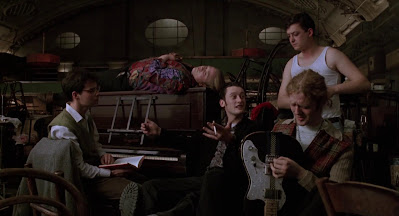Frances Doel, who has died aged 83, was a British screenwriter and production executive who earned her spurs in America as the right-hand woman of legendary independent producer Roger Corman; in her later studio roles, she was crucial to the development of James Cameron’s The Terminator (1984) and a producer on Paul Verhoeven’s Starship Troopers (1997).
Born Frances Margaret Doel in London on April 15, 1942, to Francis Doel, a sergeant in the Royal Armoured Corps and his wife Iris, she landed her big break after responding to a job ad Corman had placed on the jobs board at her alma mater St. Hilda’s College, Oxford. Decamping to Los Angeles and initially staying at the Hollywood YMCA, she gained her first credit as an associate producer on the LSD-infused The Trip (1967), written by Jack Nicholson and directed by Corman himself.
The sandy-haired Doel rapidly ingratiated herself with a gift for grabby storytelling that synched with her employer’s need to turn out fast, cheap, eyecatching product. The producer Jon Davison, a colleague at Corman’s New World Pictures, has claimed Doel “wrote just about every first draft of every picture” the company released in the 1970s.
Billed as script supervisor on The Young Nurses (1973) and Cockfighter (1974), Doel earned her first official writing credit on Big Bad Mama (1974), a drive-in favourite starring Angie Dickinson as a single mother-turned-outlaw; written over a single weekend, shot in twenty days and produced for $750,000, it wound up making $4m at the box office. Doel, however, was paid a mere $100 for her contribution.
Few of these films found their way into the pantheon. Crazy Mama (1975), with Cloris Leachman in the lead and future Oscar winner Jonathan Demme behind the camera, was shot in just fifteen days, and still somehow lost money; critics and audiences alike sniffed at the futuristic biker opus Deathsport (1978) and the flailing disaster movie Avalanche (1978).
Yet part of Doel’s remit, as head of New World’s script department, was to nurture new writing talent, such as John Sayles, the Esquire contributor she hired to pen the witty Jaws knock-off Piranha (1978), a surprise success: “Once these writers get screen credit with us,” Doel said in a 1982 interview, “they are able to get more money from another studio.”
No less upwardly mobile herself, Doel left New World to take a creative executive gig at Orion Pictures, where The Terminator landed on her desk. Ironically, its Canadian writer-director Cameron was then known only for Piranha II: The Spawning (1982), an ill-fated sequel Corman had wisely passed on, and was seeking friends in high places to help get his convoluted time-travel script greenlit.
Doel turned out to be just such an ally: “I defended it as a very good story and a very good script, which I definitely thought would have an audience… It did not seem to be the kind of movie Orion was likely to be interested in. But I was interested in having a female character who was active, not simply somebody’s girlfriend.”
Shot for $6m, the film made $78.3m on its first run, launching one of modern Hollywood’s most profitable franchises (and directorial careers). Doel oversaw several other successes at Orion – including Desperately Seeking Susan (1985) and RoboCop (1987) – before joining Disney as a development executive, working on Honey, I Shrunk the Kids and Dead Poets Society (both 1989).
After reuniting with Davison to produce Starship Troopers, Doel returned to Corman’s orbit, writing a run of direct-to-DVD creature features that started with Raptor (2001) and proceeded through Supergator (2007) to Dinoshark (2010). She was now paid $5000 per title, though she told friends Corman still grumbled if she turned out fewer than ten pages a day. Her final writing credit was on the horror flick Palace of the Damned (2013), a Corman-produced attempt to crack the growing Chinese market.
Sometime protégé Sayles – now a revered writer-director, responsible for such enduring indie dramas as Matewan (1987) and Lone Star (1996) – was among those who recalled Doel as a shrewd, kindly, cultured presence: “I always thought of Frances as the opposite of the kid who’s supposed to be reading Chaucer, but inside the book he’s got a comic book. She had the comic book on the outside and was actually reading The Atlantic.”
Her marriage to the American actor Clint Kimbrough, who starred in The Young Nurses and Crazy Mama, ended in divorce; she is survived by her longtime partner Harrison Reiner.
Frances Doel, born April 15, 1942, died May 26, 2025.












